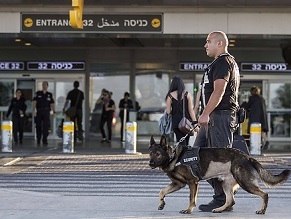|
World Jewish News

Security at Ben-Gurion International Airport (Photo: AFP)
|
'Europeans are 40 years behind Israel' in terms of airport security, Israeli expert says
24.03.2016, Israel and the World ‘’In terms of airport security, the Europeans are 40 years behind Israel," deplores , Pini Schiff, a former aviation security supreme officer at Tel Aviv’s Ben Gurion airport and currently CEO of Israel’s association of security companies, after the terrorist attacks at Brussels Airport claimed by the Islamic State.
The explosions in the departure hall of Brussels Airport prompted several countries worldwide to review or tighten airport security but also raised questions about how soon passengers should be screened when entering terminals.
Israeli Prime Minister Benjamin Netanyahu offered his Belgian counterpart Charles Michel Israel’s cooperation in the war against terror.
These terror attacks in Berussels didn''t surprise Israeli security experts. The Terrorists entered a terminal with explosives. ‘Two terrorists who enter the terminal area with explosive devices, this is undoubtedly a colossal failure," Schiff said, adding that “the chances are very low” such a bombing could have happened in Israel.
Ben Gurion International Airport near Tel Aviv, which is considered among the most secure in the world, incorporates several layers of security, even before arriving at the departures hall itself. ''''You can detect a dangerous passenger even as far as six kilometers before he can enter the terminal,'''' explains Schiff.
''''What happened at the Brussels airport must be a wake up call for the Belgian government and the other countries,'''' he adds. ''''They must manage the situation quickly because the next attack is Under way,'''' he warned.
After Palestinian attacks on Israeli planes and travelers in the 1970s, Israeli officials put in place several layers of security at that airport even before arriving at the departures hall itself, meaning an attacker who escapes notice at one level of security would likely be captured by another.
There are 11 visible security and inspection points at Ben-Gurion Airport. They spread from a roadblock at the airport entrance to the airplane gates.
The first security checkpoint is actually on the road to the airport, where security personnel check travelers and the people bringing them. All cars are stopped on the way to the aipor. Some are searched by armed guards and license plates are scanned by a computer.
Security personnel have access to passenger lists, and are able to crosscheck those lists with lists of people under surveillance in order to know immediately who has to go through a stricter security check.
There is then another layer of security to physically get into the departures hall, where passengers who arouse suspicion are checked.
Uniformed and undercover armed security personnel are stationed inside and outside the terminals. Cameras – some in plain sight, some hidden- provide additional surveillance. Travelers are subject to profiling and questioning about the purpose of their travel, their personal background and their luggage.
Israel culture is much focused on security with most citizens doing mandatory military service.
The airport handles 15 million passengers a year.
By contrast in Europe, anyone who wants to go into a departures hall can, and can even bring in luggage. The first security check only happens after checking into the flight, and after the passengers'' luggage is already tagged.
As travelers wait first to check luggage and then go through metal detectors, they crowd together in areas that are usually lightly patrolled and accessible to nearly anyone. ‘’We ignore it,’’ says Isaac Yeffet, a former head of security for Israel’s airline El Al.
Shlomo Har-Noi, whose company Shadma advises on how to secure critical infrastructure, says "in Europe and the US, they invest insane amounts of money on hi-tech security systems, but they aren''t investing in the human element. Someone who focuses on taking a water bottle away from some old lady will never find explosives."
It is not just because the Tel Aviv hub is a relatively small airport compared to major European and American airports, which can afford to exercise the strictest security measures regardless of the cost – it is the byproduct of a holistic security doctrine engraved in nearly 50 years of experience from blood and tears.
Since its first tragic failures, Israel has improved and upgraded its security measures on land and in the air. For decades, security experts from international airlines, police forces and security agencies have come to Israel to learn the country’s know-how and doctrines.
After a string of extremist attacks targeting the heart of Europe over the past year, some analysts say Europe will finally have to implement a much tougher level of security not only at airports, but also at “soft targets” like shopping malls — the kind that Israelis have been living with for years.
“The threat we are facing in Europe is about the same as what Israel faces,” said Olivier Guitta, the managing director of GlobalStrat, an international security consultancy. “We have entered an era in which we are going to have to change our way of life and take security very seriously.”
“The public needs to understand that if we are to continue enjoy living in a free society we have to respond in a proportional way,” said Simon Bennett, director of the Civil Safety and Security Unit at the University of Leicester, England.
‘’The number of suicide bombers and attacks will be determined by the results of an equation : on one side, the capabilities of the various organizations using this method of warfare, and against them the determination and capability of the security forces and intelligence services of the countries trying to thwart such attacks,’’ writes Yoram Schweitzer from the Institute of National Security Strategy (INSS) in Tel Aviv.
EJP
|
|
